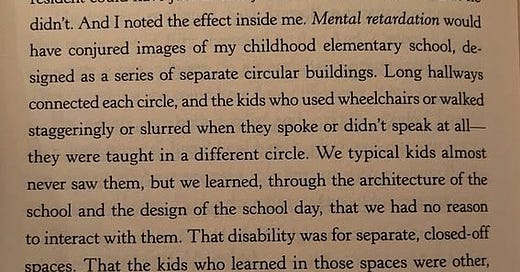Inclusion, for us, is about survival. It's not just a nice thing that feels good. It's not just about an environment and attitude for learning. It's that too. But it's also about survival.
For my kid - and so many others like him - his survival is dependent on other people being able to see his humanity. It's not his ability to comply - I can't see him anytime soon being able to suddenly comply enough to not be seen as a threat anyway. It's about others seeing his humanity.
Inclusion - and I don't mean the inclusion where a disabled kid gets to sit in the corner of a classroom coloring, or thrown into an overcrowded building without windows and told sink or swim, or pushing around the coffee cart. I mean TRUE inclusion where he knows his inherent belonging in the classroom, and the rest of the class sees the humanity and belonging in every kid in the class. Where every kid gets to be their full selves and their full selves is valued as a part of the community. The inclusion that, although rare, is disproportionately given to white kids in this country, and disproportionately removed from Black kids.
I'm under no false pretenses that for marginalized folks, simply existing in a classroom means that other people see your humanity. But you know what definitely doesn't lead to being seen as a human? Or being seen at all? Being squirreled away from everyone else at the age of 2 years old. If you're lucky, showing up for lunch and recess. Especially when you're already a person who isn't going to be able to attend the local church, the soccer club, the block parties. You literally, do not exist. When people encounter your body and see you as threatening, you are someone who has NEVER EXISTED to them.
My kid's survival, and other kid's like him, is dependent on people seeing his humanity from when they - everyone else - are kids. Everyone being brought up knowing he's a person - not because they read about it in a book about disabilities, but because they have never even had a chance to question if he should be there. They've never even questioned that Black disabled people belong.
When folks - usually white folks with ND kids with low support needs - argue against inclusion, I imagine they're seeing their kids go to a nice school like NEST (NEST is a NYC for autistic kids who MUST communicate well AND be able to show they are at or above age-level-cognitive skills to be allowed in. Very few autistic kids get in.). They're looking for their kids to get support and accommodations to get the best damn education they can get their white kids. They're seeing their kids be celebrated for their Neurodivergence, while getting a rigorous academic curriculum, AND being told they belong for exactly who they are. They're celebrating their strengths! They're fine being in a class of mostly other white people. They're getting taught how to ask for the accommodations that they need so that once they graduate and go to university and then get jobs, they're confident in being able to self advocate for what they need to work. They're white, so competence is presumed. They're families whose kids have the language skills to express if they're being abused, restrained, or secluded in class.
I was talking to a friend of mine, a Black man, about service animals. How for some Black disabled people a service animal is as much about protecting the person from those around them. A service animal, I'm told, can disarm passerbys who might be a threat to a Black disabled person whose body is moving in unexpected ways. Think about that. We're talking about the need for a cute dog to help people see my kid's humanity.
Inclusion won't magically fix things, especially in this country right now. But segregation won't either. As Heather Lanier reflected in her book, when thinking about the impact of disabled kids being in separate classes in her building:
"We typical kids almost never saw them, but we learned, through the architecture of the school and the design of the school day, that we had no reason to interact with them. That disability was for separate, closed-off spaces. That the kids who learned in those spaces were other, were incapable of relationships with us. And their invisibility led to the mythology that they were broken."
Add to that the wisdom from Resmaa Menakem (My Grandmother's Hands - go read it if you haven't), and broken, for a Black man, becomes "a threat that needs to be extinguished."
(PS - if you want my google doc of some inclusion resources let me know and I'll share it).




Thank you. Thank you.